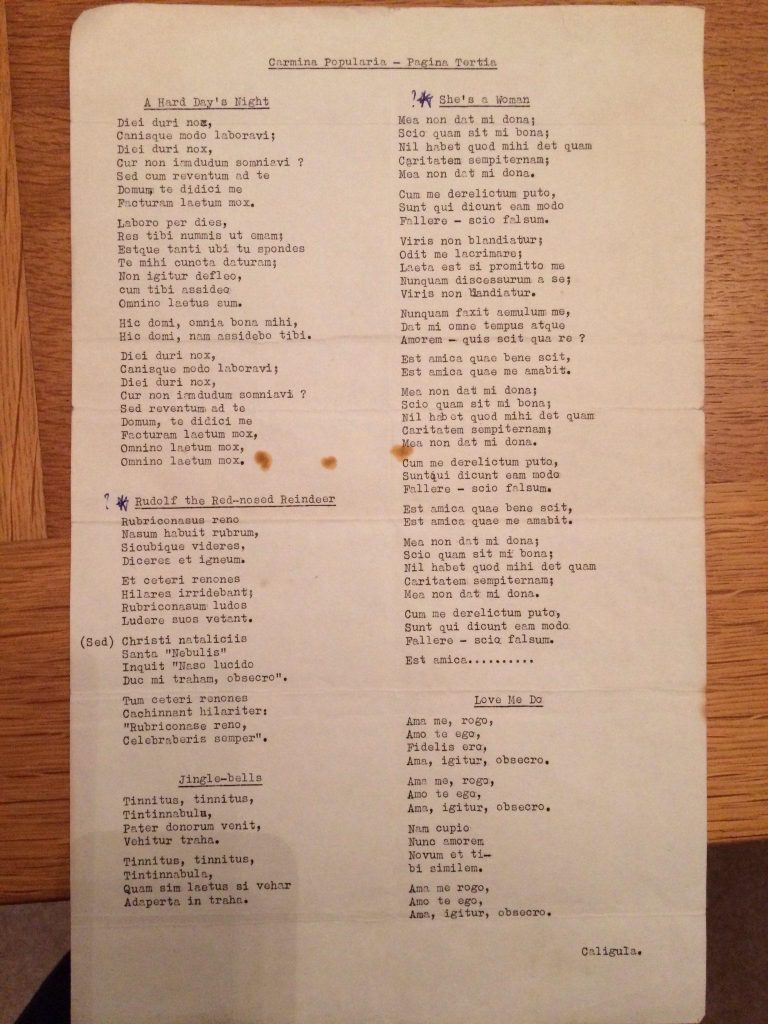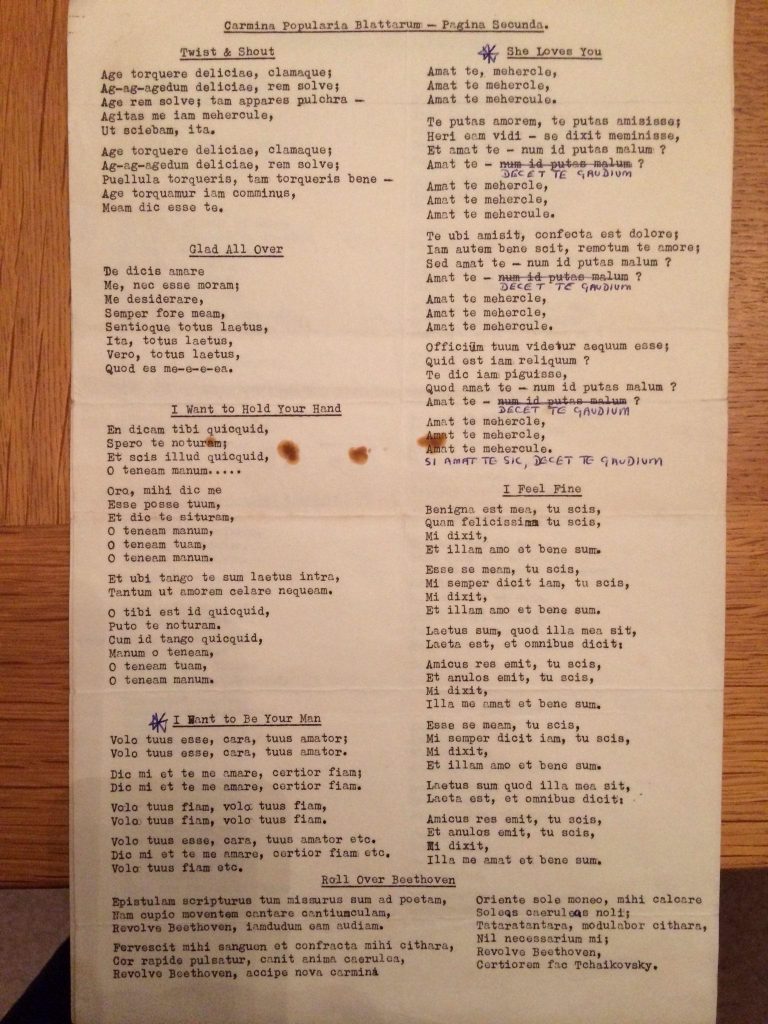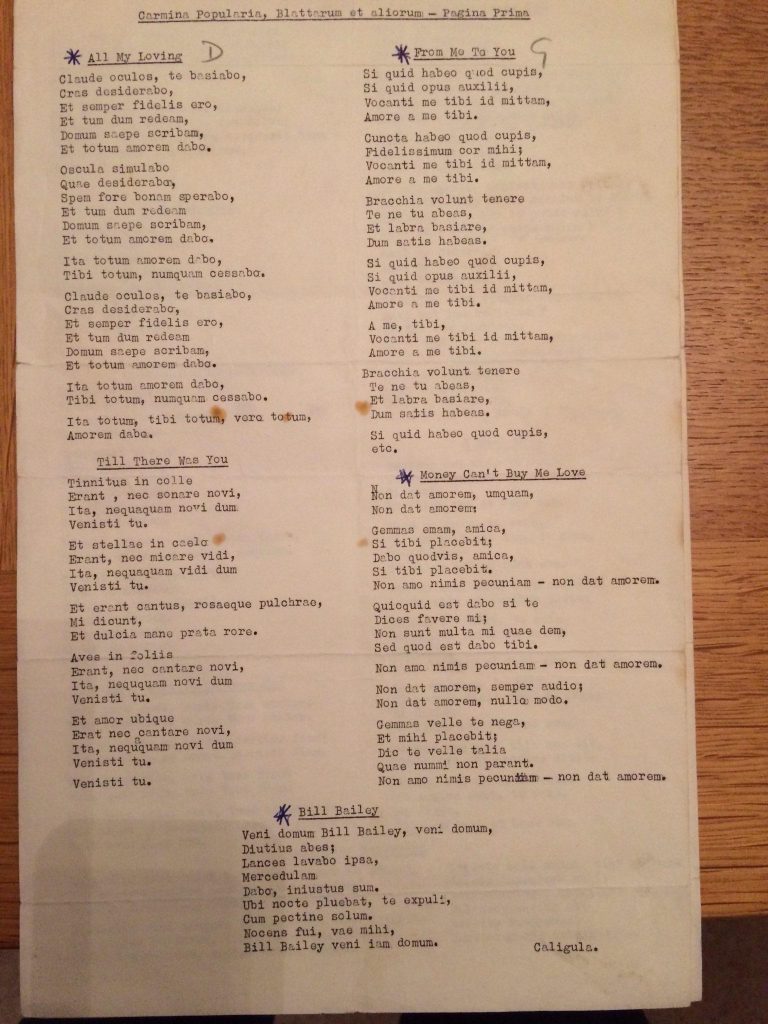
Click here (and then click the image) to view in a larger format.
I’ve interacted with many entertaining language-learning resources in various classes—from miniseries in Spanish to comic books in French—all geared toward making the unfamiliar language relevant to daily life. Learning counterintuitive pronunciations, parsing a new system of grammar, or memorizing the genders of word after word can be laborious and intimidating in the classroom. Doing so in everyday pop cultural settings, not as much.
When it comes to the teaching of dead languages, the resources can seem less approachable. I certainly appreciate the literary and rhetorical genius of Virgil, Ovid, Horace, Cicero, and Julius Caesar. But during my high school years, I did not always find their work easy to read in English, much less in formal classical Latin. The elation I felt after successfully translating a passage was sometimes dampened as I puzzled over historical notes and glosses that often left me with more questions than answers.

Click here (and then click the image) to view in a larger format.
That’s not at all to say that students of Latin shouldn’t be exposed to cultural and historical context or read the finest exemplars of the written language. Only that a break from the heavy stuff now and then goes a long way. Might I submit to Latin instructors one ingenious tool from Eddie O’Hara, former British Labour Party MP and classics teacher? O’Hara passed away in May of last year, and just this past week, his son Terry O’Hara tweeted these translations of Beatles songs (including two Christmas tunes) his father made in the 60s for his students. At the time, these were the height of pop culture relevance, and, while a far cry from the complexities of the Aeneid, a fun way for Latin learners to relate to a language that can seem cold and imposing.
I will admit, my Latin has fallen into such a state that I can’t immediately vouch for the accuracy or elegance of these translations (“cue fierce arguments among Latin grammarians,” replies one Twitter user), but there’s no reason to doubt Mr. O’Hara knew his stuff. ““He was a born educator,” his son remembers, “He was a teacher and classicist by background and he had a strong interest in educational matters and Greek cultural heritage.” Educated himself at Magdalen College, Oxford, O’Hara taught at Perse School, Cambridge, Birkenhead School, and in the early 70s, C.F. Mott College in the Beatles’ own Liverpool.

Click here (and then click the image) to view in a larger format.
In addition to his role as a statesman, the Liverpool Echo remembers O’Hara’s many decades as “a popular teacher who brought classes to life translating Beatles lyrics into Latin.” We do not have any indication of whether he actually tried to sing the lyrics, though his students surely must have attempted it. What must the chorus of “All My Loving” sound like as “Ita totum amorem dabo, Tibi totum, numquam cessaba”? Or “She Loves You” as “Amat te, mehercle”? Singing them to myself, I can see that O’Hara was sensitive to the meter of the original English in his Latin renderings. But I’d really love to see someone set these to music and make a video. Any of our readers up to the challenge?
Finally, since early sixties Beatles lyrics aren’t as likely to engage students in 2017, what pop cultural material would you translate today—classics teachers out there—to reach the bemused, bewildered, and the bored? If you’re already hard at work using hip resources in the classroom, please do share them with us in the comments!
Note: To view the images in a larger format, please click on the links to these individuals images: Image 1 - Image 2 — Image 3. When the image opens, click on it again to zoom in.
Related Content:
Learn Latin, Old English, Sanskrit, Classical Greek & Other Ancient Languages in 10 Lessons
What Ancient Latin Sounded Like, And How We Know It
Josh Jones is a writer and musician based in Durham, NC. Follow him at @jdmagness


Perhaps he inspired Cat Stevens’ “O Caritas”!
Check out a terrific CD ‘THE LEGEND LIVES FOREVER in LATIN — ELVIS SONGS SUNG IN LATIN’ — translated and performed by Dr. Ammondt. Includes booklet with lyrics in English and Latin. Copyright 1995 by K‑tel International (USA)
‘dies duri nox’ and ‘o teneam manum’. Get it right!
These are clever, because they are accurate translations, correct Latin and can be sung.
That is “Diei Duri Nox”, not “Noz” (Z was only used in Greek transliterations).
Whoops! Thanks for catching that! Corrected…
I am Eddie O’Hara’s son, Terry (who posted the original Tweet). In your article you wonder what it would be like to have one of the translations set to music.
You might be interested to know that there is an American Latin teacher in New Jersey (and former US spy and now Russian Orthodox Deacon!) who has a website where he also translates popular songs into Latin.
http://www.keithmassey.com/aboutkeithmassey.html
He saw my Tweet and set my dad’s translation of ‘From Me To You’ to music and created a music video in tribute to him.
http://aplaceofbrightness.blogspot.co.uk/2017/01/a‑latin-language-version-of-from-me-to.html
Hi, I’m sorry but your headline still has the wrong Latin:
It’s “O teneam manum” (not teneus). It’s really important because “teneam” is subjunctive and means “may I hold”. Teneus doesn’t mean anything as far as I know.
Please do correct it!
Thanks.
Hic est America…
*Haec est America… ;)